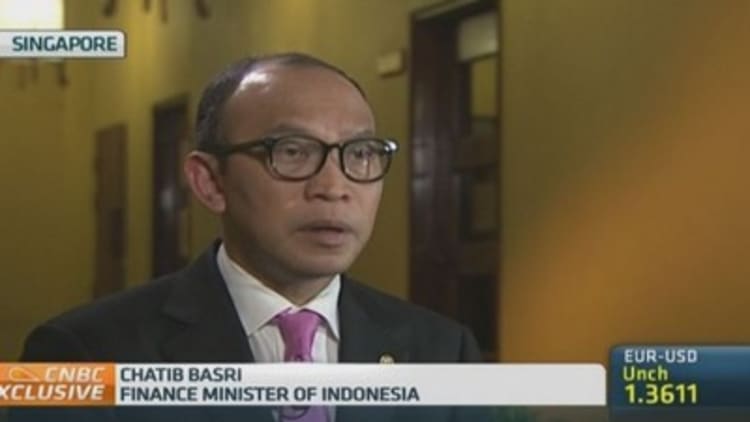"Sell deficits, buy surpluses" was a winning strategy for emerging markets in 2013, but the new mantra for investing in developing economies may be "sell commodities, buy manufacturers", says Citi.
"It is unlikely that 'deficits vs surpluses' will always govern investor behavior towards emerging markets, especially now that this theme is becoming a little less relevant due to the current account adjustment that's taken place in some of the most vulnerable countries," Citi strategists led by Guillermo Mondino wrote in a report.
Countries with current account deficits such as Brazil, India, Indonesia, Turkey and South Africa – dubbed the Fragile Five - suffered for most of last year amid concerns over the Federal Reserve scaling back monetary stimulus, while those with current account surpluses including Korea, Hungary and Israel performed well.
Read MoreMalaysia: Next emerging market whipping boy?
Emerging market policymakers have since stepped up efforts to bring their deficits under control. However, their efforts have had varied success.
"Some of the disappointments in the Fragile Five adjustment process are explained by disappointing commodities markets," Mondino said, pointing to Indonesia, South Africa and Brazil.
"Meanwhile, India and Turkey – the two Fragile Five members with the largest manufactured exports sectors – seem to be having better luck adjusting their trade balances," he added.
In Indonesia, for example, the current-account gap widened slightly in the first quarter to 2.06 percent of gross domestic product (GDP), compared with 1.98 percent in the previous three months.
Read MoreTop mutual fund managers push these markets
And Citi says weakening commodity exports will widen the current account gap further. It recently revised its 2014 current account deficit target for Indonesia to 2.8 percent of GDP from 2.5 percent.
Coal – the country's biggest mining export – for example, is declining not only in terms of volume but also value due to weak prices. During the first four months of the year, Indonesia's total coal exports totaled $7.4 billion, compared with $8.5 billion in the same period a year earlier, according to Societe Generale.

By contrast, India's current account position has been on the mend, largely helped by slowing gold imports. The country's current account deficit narrowed to a four-year low of $1.2 billion in the first three months of the year, compared with $4.2 billion for the prior quarter.
"The 'end of the commodities super-cycle' is by now a familiar idea, but it does seem as though its consequences have become more visible. Broad-based commodities price deflation seems well-established– and this is causing commodities-exporters to suffer more than their manufacturing counterparts," Mondino said.
The bank classifies commodity exporters as Argentina, Brazil, Chile, Colombia, Indonesia, Peru, Russia, South Africa and Ukraine and manufactured goods exporters as China, Czech, Hungary, India, Israel, Korea, Mexico, Malaysia, Philippines, Poland, Romania and Turkey.
Read MoreStick with the emerging markets: Aberdeen CEO
Of the commodity exporters, all countries but Russia experienced negative export growth during the past three quarters, according to the bank. By contrast, of the manufacturing exporters, only Thailand suffered negative export growth.
"As a result of these trends, the current account balance of commodities exporters has been deteriorating much more markedly than in manufacturing economies. In a sense, manufacturing exporters now have some kind of competitiveness-advantage over commodities exporters," he said.
Nizam Idris, head of strategy, fixed income and currencies at Macquarie Group says it makes sense to favor commodity exporters over manufacturing exporters as commodity prices are likely to come under further pressure when the U.S. begins to hike interest rates.
Read MoreAre emergingmarkets giving off bad vibes?
"Broadly speaking that's a strategy I can agree with. I'm not a big fan of commodity currencies," he said.
But, Idris has doubts over whether manufacturing exporters are going to do significantly better as global demand has yet to recover strongly.
"If manufacturing is going to recover in a big way, you need global demand to recover strongly. So far the recovery has been gradual, not enough for manufacturers to hit escape velocity," he said.


